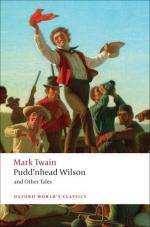There was not much time to spare, but the captain made the most of it. The three boats were launched—long-boat and two quarter-boats. That the time was very short and the hurry and excitement considerable is indicated by the fact that in launching the boats a hole was stove in the side of one of them by some sort of collision, and an oar driven through the side of another. The captain’s first care was to have four sick sailors brought up and placed on deck out of harm’s way—among them a ‘Portyghee.’ This man had not done a day’s work on the voyage, but had lain in his hammock four months nursing an abscess. When we were taking notes in the Honolulu hospital and a sailor told this to Mr. Burlingame, the third mate, who was lying near, raised his head with an effort, and in a weak voice made this correction—with solemnity and feeling:
’Raising abscesses! He had a family of them. He done it to keep from standing his watch.’
Any provisions that lay handy were gathered up by the men and two passengers and brought and dumped on the deck where the ‘Portyghee’ lay; then they ran for more. The sailor who was telling this to Mr. Burlingame added:
‘We pulled together thirty-two days’ rations for the thirty-one men that way.’
The third mate lifted his head again and made another correction—with bitterness:
’The “Portyghee” et twenty-two of them while he was soldiering there and nobody noticing. A damned hound.’
The fire spread with great rapidity. The smoke and flame drove the men back, and they had to stop their incomplete work of fetching provisions, and take to the boats with only ten days’ rations secured.
Each boat had a compass, a quadrant, a copy of Bowditch’s ‘Navigator,’ and a Nautical Almanac, and the captain’s and chief mate’s boats had chronometers. There were thirty-one men all told. The captain took an account of stock, with the following result: four hams, nearly thirty pounds of salt pork, half-box of raisins, one hundred pounds of bread, twelve two-pound cans of oysters, clams, and assorted meats, a keg containing four pounds of butter, twelve gallons of water in a forty-gallon ‘scuttle-butt’, four one-gallon demijohns full of water, three bottles of brandy (the property of passengers), some pipes, matches, and a hundred pounds of tobacco. No medicines. Of course the whole party had to go on short rations at once.
The captain and the two passengers kept diaries. On our voyage to San Francisco we ran into a calm in the middle of the Pacific, and did not move a rod during fourteen days; this gave me a chance to copy the diaries. Samuel Ferguson’s is the fullest; I will draw upon it now. When the following paragraph was written the doomed ship was about one hundred and twenty days out from port, and all hands were putting in the lazy time about as usual, as no one was forecasting disaster.




